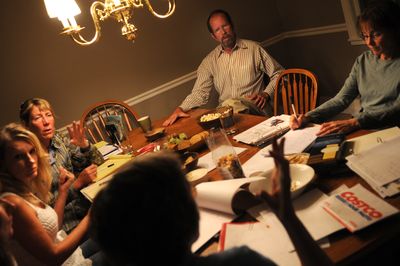Medical mission
Fundraiser planned to help build new clinic in poor village in Kenya

When you witness destitution, homelessness and orphaned children firsthand in a Third World country, going back is something you just have to do, Stacey Mainer said.
The north Spokane resident recalled her first trip to a poor area of Kenya, where the average woman lives to 38 and AIDS is rampant. A woman delivered her baby on a mat on a dirt floor with locals peering in.
“I really can’t explain it,” Mainer said. “Once you go there, your whole life is different.”
Mainer, a registered nurse practitioner, and her husband Mike, an emergency room physician at Valley Hospital and Medical Center, have visited many Third World countries on medical missions. But their trip to Migori and Kopanga, Kenya, in June 2007 inspired Stacey Mainer to form Partners for Progress, a nonprofit organization aiming to ensure access to health care, education, sanitation and clean water in impoverished countries.
Several Spokane medical professionals and others have joined the cause. Sandy Ivers and her 16-year-old son Nick accompanied the Mainers on their trip to Kopanga last year.
“I don’t have a medical background, but because I want to help, there’s a place for me there,” said Ivers, a retired teacher. She acted as a pharmacist while Nick took the patients’ vitals. “Once you go, you realize, ‘Wow, we have so much, and there’s so much we can give easily,’ ” Ivers said.
The group’s short-term goal is to raise $25,000 for a new medical clinic in Kopanga. The current one – a rented, dilapidated space with no running water or electricity – is “just atrocious,” Mainer said. It houses one of two latrines in the entire village.
While researching missions, the Mainers came across the clinic’s director, Alice Kephas, who was seeking foreign doctors to train and educate her. Kephas is a registered nurse doing midlevel nurse practitioner work – such as sutures and delivering babies.
There is an extreme shortage of medical personnel in Kenya – one doctor for every 50,000 people – Mike Mainer said.
“Kenya and other African countries have gone backwards in their ability to provide medical care in the past generation,” he said. “… Plus the fact that the population is getting sicker.”
Because Kopanga borders Tanzania, transients carry HIV back and forth. Mainer remembered a man she met last year whose wife had died from AIDS a year earlier. He still hadn’t been tested.
“He was emaciated. You could only guess he had HIV,” but he couldn’t get transportation to the clinic for testing, she said.
One of the organization’s goals is providing extensive training to medical providers, then setting them up with necessities to carry on their work once the group has left.
In Kenya, patients with a fever are treated for malaria. Julie Ernst, a Spokane medical technologist who will join the group when it heads back to Kopanga in January, will teach Kephas and other medical providers how to diagnose diseases and choose medications.
Ernst was persuaded to join the cause after hearing Stacey Mainer’s stories.
“When you understand how little some people have in this day and age … it just inspires you to help,” Ernst said. “I’m so blessed in my life and have a comfortable life that I just want to give back.”
Mike Mainer said the trips made the group refocus its priorities.
“You can easily get too comfortable, too complacent,” he said.
“We have so much that we take for granted,” Ivers added. “Running water, our roads, cars, that our clothes are clean.”